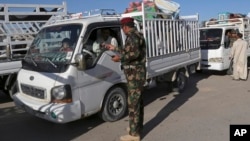Nineteen months ago, the violent extremist group DAESH, also known as ISIL, controlled about one third of the territory of Iraq, and much the same in Syria. Supremely confident after their rapid conquest of these territories, ISIL trumpeted to the world its conviction that its fighters were unstoppable.
Today, it is clear that DAESH’s days are numbered, said Secretary of State John Kerry during a recent press conference in Baghdad.
“In Iraq, DAESH fighters have not been on the offensive in months. They are losing ground, including more than 40 percent of the territory that they once controlled in Iraq,” he said.
Over the past year, Iraqi forces liberated Tikrit and most of the city’s population has returned. Kurdish and Yezidi forces liberated Sinjar, Iraqi Security Forces retook Ramadi and Syrian Democratic Forces have retaken thousands of square kilometers from Daesh in northeast Syria.
The coalition bombing campaign has also seen great success, having cost DAESH tens of thousands of fighters and more than a hundred senior and mid-level leaders, including their so-called ministers of war and finance.
There is still much to do, but DAESH is clearly on the defensive. Today, we are gearing up for recovery. Before displaced Iraqi civilians can return home, significant work needs to be done to stabilize areas that encountered significant levels of destruction due to Deash’s occupation and the fight required to liberate these areas.
For that reason, the United States has joined other members of the Coalition to contribute a total of over $100 million to the United Nation’s Funding Facility for Immediate Stabilization. The program, led jointly by the UN Development Programme and the Government of Iraq, helped over 100,000 Iraqis return to their homes in Tikrit. Now it is working to do the same in Ramadi through restoring basic services, so people can return to their homes there.
Since the beginning of the crisis, the United States has provided more than $623 million in humanitarian aid to Iraqi refugees, and in Baghdad Secretary Kerry announced an additional $155 million for Iraqis affected by the ongoing violence.
“Our support for the Iraqi people,” said Secretary of State Kerry, “is part of our larger commitment to a future Iraq as defined in its constitution, an Iraq that is unified, pluralistic, federal, and democratic.”






